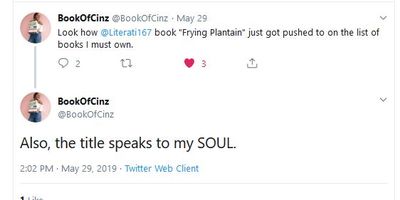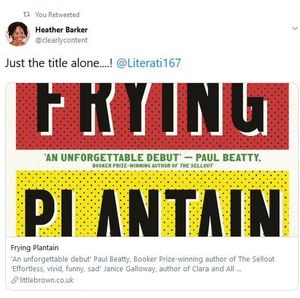Behind the Title: "Frying Plantain"
By Zalika Reid-Benta
This is my last post for Open Book and I’ve been thinking about how I should end my June tenure as Writer in Residence. I landed on writing about the title of my book. I’ve been asked a few times why I chose to call my collection Frying Plantain and usually I joke, “I just really love plantain” (which is true) and I talk about how the short story for which it's named explores family, generational differences and forgiveness so I thought it was a good title for the collection as a whole (which is also true). But I wanted to expand on that a little more because the nuances of my decision is not something I’m able to succinctly explain in a panel conversation.
One of the most satisfying feelings I’ve experienced since my book came out is when people see my book cover and express excitement and joy and how much they relate to the title:
It fills me with pride because the title speaks to more than what’s directly happening to Kara and her friends and family in the stories. When I was younger there was a Facebook group called “there’s nothing like waking up to the smell of frying plantain in the morning”. Even going through the #fryingplantain hashtag on Twitter, you come across posts like these:
Your CanLit News
Subscribe to Open Book’s newsletter to get local book events, literary content, writing tips, and more in your inbox
Instead of calling the book Fried Plantains, which is the dish itself, I decided to name the collection after the action of actually making the dish, because as seen through the different tweets, frying plantain is an art form. It requires precision and a close eye, from calculating the ripeness of the fruit, which dictates the sweetness of the end result, to making sure it doesn’t burn once it’s in the pan. In the titular story, Kara marvels more at the art than the food itself. As she watches her grandmother make her favourite dish, she’s in awe of the beauty within the preparation and contemplates how she never quite got the hang of it. Not only did I think that that moment encapsulated a lot of the themes and subject matter in the collection as a whole, I thought it spoke to an aspect of the diaspora/third culture experience: trying to connect to home through cooking while knowing you may never get it as right as your parents or grandparents.
Like many children of the diaspora, food was --- and is --- one of the primary connections I had to my culture and my heritage. Being of Jamaican descent, there are many types of food and dishes that provide me with a sense of home: oxtail and rice, cornmeal porridge, bun and cheese, and more. However, plantain, from its taste to its smell, strikes a different sense of nostalgia than the other dishes and it’s because of its association with comfort and therapy: there is a certain childlike wonder that blooms within you when you eat a plantain fried to perfection. It's that feeling that I wanted to capture in my book title.
Of course, when people see Frying Plantain and instantly relate to it, they each have their own associations and experiences (childhood or otherwise) tied to the dish, but the fact that it calls to something sentimental within them, the fact that there’s a communal understanding of the title and what it means and why, says that it did what I wanted it to, it told the diaspora: This is a book for us, about us.
The views expressed in the Writer-in-Residence blogs are those held by the authors and do not necessarily reflect the views of Open Book.
Zalika Reid-Benta is a Toronto-based writer whose work has appeared on CBC Books, in TOK: Writing the New Toronto, and in Apogee Journal. In 2011, George Elliott Clarke recommended her as a “Writer to Watch.” She received an M.F.A. in fiction from Columbia University in 2014 and is an alumnus of the 2017 Banff Writing Studio. She completed a double major in English Literature and Cinema and a minor in Caribbean Studies at University of Toronto’s Victoria College. She also studied Creative Writing at U of T’s School of Continuing Studies. She is currently working on a young-adult fantasy novel drawing inspiration from Jamaican folklore and Akan spirituality.







